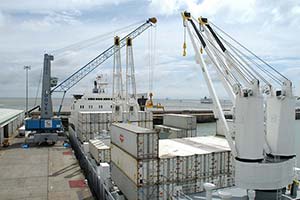As British Prime Minister Theresa May struggles to push through Parliament the Brexit deal she brought home from Brussels, the real possibility of a no-deal Brexit alternative continues to worry the food industry on both sides of the English Channel. From tightening availability of cold storage space in the United Kingdom to concern about chaos at Dover and other major commercial ports and roadways, government officials are getting an earful from both sides of the leave or stay divide.
 Retailers and manufacturers of frozen foods and other products are stockpiling inventory just in case a post-Brexit deal does not get sealed before the pending March 29 divorce between the UK and EU goes into effect. Add to that the rumor that online retail giant Amazon is reserving warehouse space in advance of its entry into the British food market in earnest, and it is clear the squeeze is on big time.
Retailers and manufacturers of frozen foods and other products are stockpiling inventory just in case a post-Brexit deal does not get sealed before the pending March 29 divorce between the UK and EU goes into effect. Add to that the rumor that online retail giant Amazon is reserving warehouse space in advance of its entry into the British food market in earnest, and it is clear the squeeze is on big time.
Appearing before the House of Commons’ Business, Energy and Industrial Strategy Committee (BEIS) in London on November 27, Nestlé Director Ian Rayson commented:
“We have been stock building some products that we import into the UK, and we are stock building in other European markets, some products that we would export from the UK to there. So we are stock building at both ends, but this is only for a period of weeks.
“There are limits to how much stock you can build for lots of different reasons. Warehousing is one issue and certain ingredients have a fairly limited shelf life so there are some limitations from that point of view.”
Packaging Costs Rising
Joining Rayson at the meeting was Ian Wright, director general of the UK’s Food and Drink Federation (FDSF), who confirmed that the shortage of warehouse space has driven up costs for those looking to find pallet places to store their goods. He went on to discuss other issues affecting the industry, including as the rising cost of packaging.
 “There are some significant challenges, in relation particularly to cardboard and paper-based packaging,” said Wright. “If I remember my figures correctly, of the 600,000 tons used every year, 90% is imported. Eighty percent of it imported from the EU, so any blockage in the supply chain as a consequence of a no-deal Brexit would be pretty calamitous because you only hold – typically in the whole of the industry – somewhere between eight and ten weeks of stock.
“There are some significant challenges, in relation particularly to cardboard and paper-based packaging,” said Wright. “If I remember my figures correctly, of the 600,000 tons used every year, 90% is imported. Eighty percent of it imported from the EU, so any blockage in the supply chain as a consequence of a no-deal Brexit would be pretty calamitous because you only hold – typically in the whole of the industry – somewhere between eight and ten weeks of stock.
“What we have seen in the last few months is prices rising because there is some scarcity and people are forward-buying.”
As for the Food and Drink Federation’s official position on the possibility of a Brexit agreement, Wright issued the following statement after Prime Minister May announced the deal negotiated with the European Union in Brussels, more than a week prior to the BEIS session:
“We would welcome any clarity relating to a potential agreement with the EU. While this is a step in the right direction, uncertainty remains. Food and drink manufacturers will have to continue planning for a variety of scenarios until our politicians have cast their judgment on the suitability of this deal. This will result in businesses incurring significant costs and devoting additional time and effort to such endeavors. Until the withdrawal agreement implementation bill receives Royal Assent, the specter of a no-deal Brexit looms large over our industry.”
Port Disruption Fears
 A number of members of Parliament have recently voiced concern of a real prospect” of “major disruption” at UK commercial ports in the event of a hard Brexit with no deal in place.
A number of members of Parliament have recently voiced concern of a real prospect” of “major disruption” at UK commercial ports in the event of a hard Brexit with no deal in place.
“The future of road, rail, maritime and air access to Europe after Brexit remains unclear and the Department for Transport has a critical role in ensuring the UK is prepared,” stated Public Accounts Committee (PAC) Chairwoman Meg Hillier. “With so little time remaining, there is still much to do. The risks associated with no-deal are severe, yet plans for avoiding disruption around major ports in particular are worryingly under-developed.”
 Meanwhile, in response to the PAC’s report on the Department of Transport’s (DfT) implementation of Brexit, UK Road Haulage Association (RHA) Chief Executive Richard Burnett commented: “This report confirms what so many members have told us. Information has been patchy, often unhelpful, confusing and generally too little, too late. This has left hauliers at the sharp end of a bad Brexit outcome, struggling to keep the supply chain operating and their firms in business.”
Meanwhile, in response to the PAC’s report on the Department of Transport’s (DfT) implementation of Brexit, UK Road Haulage Association (RHA) Chief Executive Richard Burnett commented: “This report confirms what so many members have told us. Information has been patchy, often unhelpful, confusing and generally too little, too late. This has left hauliers at the sharp end of a bad Brexit outcome, struggling to keep the supply chain operating and their firms in business.”
The RHA urges hauliers who operate internationally to plan ahead for a no-deal Brexit and apply now for annual ECMT permits. The deadline is December 21. – Reported by John Saulnier





